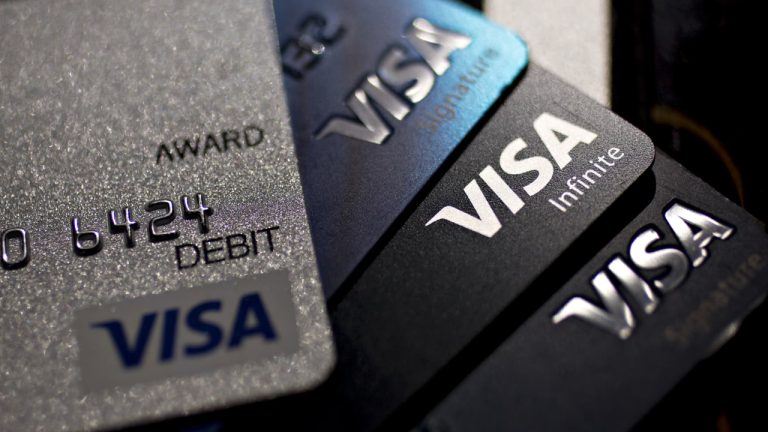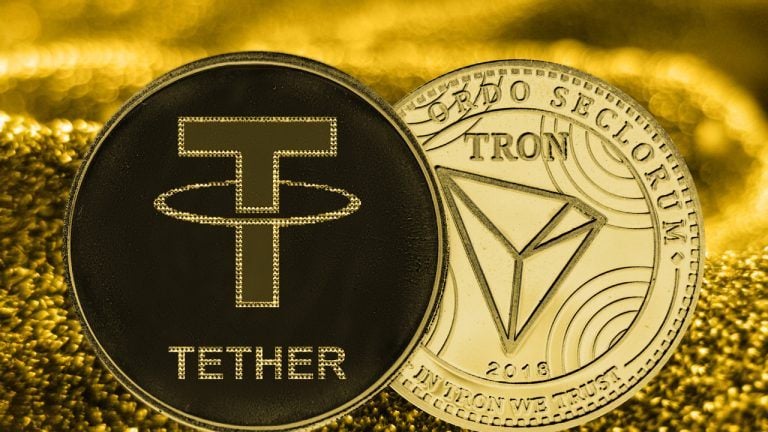 Pyypl, a fintech company operating in the Middle East and Africa (MEA), has partnered with Visa to introduce virtual and physical prepaid Visa cards via its mobile app. This strategic collaboration aims to enhance financial inclusion across the region, providing underserved populations with greater access to financial services. The integration of Visa virtual cards will […]
Pyypl, a fintech company operating in the Middle East and Africa (MEA), has partnered with Visa to introduce virtual and physical prepaid Visa cards via its mobile app. This strategic collaboration aims to enhance financial inclusion across the region, providing underserved populations with greater access to financial services. The integration of Visa virtual cards will […]
New data reveals the daily average volume of the stablecoin Tether (USDT) over the Tron (TRX) blockchain has surpassed that of credit card giant Visa. In a new post on the social media platform X, market intelligence firm Lookonchain notes that earlier this week, the 24-hour trading volume of Tether’s dollar-pegged digital asset over Tron […]
The post Tether’s USDT on TRON Network Surpasses Visa’s $42,000,000,000 Daily Average Volume: Lookonchain appeared first on The Daily Hodl.
 According to data from the X account Lookonchain, the 24-hour trading volume of tether on the Tron network has surpassed Visa’s average daily transaction volume. Additionally, despite a general downturn in the crypto economy, tron (TRX) has achieved a 2% gain against the U.S. dollar over the past week. Tron Network’s USDT Volume Hits $53 […]
According to data from the X account Lookonchain, the 24-hour trading volume of tether on the Tron network has surpassed Visa’s average daily transaction volume. Additionally, despite a general downturn in the crypto economy, tron (TRX) has achieved a 2% gain against the U.S. dollar over the past week. Tron Network’s USDT Volume Hits $53 […]

Research firm Sacra predicts stablecoins will “eclipse” Visa on total payments volume this quarter, but Visa's head of crypto doesn’t agree.
Stablecoins may finally overtake payment giant Visa in total payment volume this quarter, according to research firm Sacra.
Visa's head of crypto, however, disagrees.
In a blog post by Sacra co-founder Jan-Erik Asplund, the firm argued that stablecoins’ "extreme product-market fit for cross-border money movement" could see its total payments volume exceed Visa, reaching over $4 trillion.

Financial services giant Visa just launched a new tool to provide the public with more accurate data on key stablecoin activities. In a series of posts on social media platform X, Visa’s head of crypto Cuy Sheffield says the payments firm partnered with data platform Allium to create the Visa Onchain Analytics Dashboard as a […]
The post Payments Giant Visa Rolls Out New Stablecoin Tool To Provide More Accurate Data on Transaction Volumes appeared first on The Daily Hodl.

The financial services giant wants to make data about stablecoin usage clear and accessible, which requires some processing.
Visa has premiered an Online Analytics Dashboard for stablecoins. The website seeks to cut through the “noise” to provide easily accessible and digestible data on four stablecoins across nine blockchains.
In a blog post introducing the new service, Visa head of crypto Cuy Sheffield stated that stablecoin data, despite being publicly available in real time, requires interpretation before they can be compared to activity on traditional financial networks.
The noise in stablecoin data is the result of their varying use cases. Smart contracts, or “bot programs,” are used for arbitrage, liquidity provision, market making and other functions in decentralized finance (DeFi) that are not comparable to “settlement in the traditional sense.” Visa applies filters out bot activity:

Leading banks and credit card giants are reportedly now participating in a tokenized deposits pilot project launched by industry body UK Finance. According to a new report by Bloomberg, companies that include Barclays, Citigroup, Mastercard and Visa are teaming up for the effort. The project aims to create a commercial banking system for tokenized deposits […]
The post Barclays, Citi, Mastercard and Visa Joining UK Pilot for Tokenized Deposits Testing: Report appeared first on The Daily Hodl.

Visa’s new artificial intelligence advisory practice will leverage more than 1,000 analysts and consultants around the globe.
Visa announced the launch of its new global artificial intelligence advisory practice on Nov. 8. The consultation service will be part of Visa Consulting & Analytics (VCA) and, according to a press release, focus on “providing actionable insights and recommendations to empower clients to unlock the potential of AI and utilize generative AI.”
Citing its “30-year AI legacy,” Visa announced the new practice alongside a range of new services related to empowering clients to understand the potential role of generative AI at the enterprise level.
Using 30 years of knowledge and experience, Visa is launching an AI Advisory Practice, a service that will help clients tap into the power of #AI and #genAI to improve payments experiences and help supercharge growth. Learn more: https://t.co/CROI8Sqra4
— VisaNews (@VisaNews) November 8, 2023
#VisaConsultingAnalytics pic.twitter.com/RAgjAYgrnU
The service will be tended by VCA’s global network of “over 1,000 consultants, data scientists and product experts in 75 offices on six continents,” according to the press release.
Carl Rutstein, global head of advisory services at Visa, said the practice will offer a full suite of client services:
“AI is not just reshaping industries worldwide – it’s revolutionizing them, and the payments sector is at the forefront of this transformation. Visa doesn’t just use AI to help improve payment experiences – our Advisory business is also harnessing it to empower our clients to grow and redefine how they serve their own customers through acquisition, engagement, retention, and risk management.”
This news comes on the heels of a $100 million AI venture fund launched by the company on Oct. 2. As Cointelegraph reported, the fund is set up to support innovation and development in the generative AI space.
Generative AI is a burgeoning sector of machine learning that involves the use of models designed to produce human-like content such as text, images, audio or video files within the constraints of a specific training set. The most popular models, including OpenAI’s ChatGPT and Anthropic’s Claude 2, have been widely adopted for personal and enterprise use.
Related: IBM launches $500M fund to develop generative AI for enterprise

Mastercard ended its partnership in Latin America and Bahrain with Binance in September, possibly due to the regulatory environment.
Binance Visa debit card services will close down in the European Economic Area (EEA) on December 20, according to an announcement by the cryptocurrency exchange on Oct. 20. Binance accounts will be unaffected.
According to a Binance letter to customers posted online, the Binance card issuer, Finansinės paslaugos “Contis” — or Contis Financial Services — will stop issuing the card. Contis is a Lithuanian electronic money institution and currency exchange operator owned by German banking-as-a-service platform Solaris Group, which is active in 30 European countries.
The Binance Visa debit card converts crypto in users’ Binance accounts into local currencies, thus allowing them to use crypto to pay for purchases in stores and online. The EEA comprises all 27 European Union member states and Iceland, Liechtenstein and Norway.
And here goes the #Binance Visa Debit Card!
— Michael ⚡️S⚡️ (@M_affirmed) October 20, 2023
First Paysafe providing EUR on/offboarding, now Contis providing the debit card, what's next? pic.twitter.com/e7EF7G7CVN
The Binance Visa debit card was introduced in the EEA in September 2020. At the time, there were plans to introduce Binance cards in Russia and potentially the United States as well. A Binance spokesperson told Cointelegraph in a statement:
"Although Binance users from around the world have enjoyed using [the Binance Visa debit] Card to make day-to-day payments with crypto assets, only around 1% of our users are impacted by this change."
The closure of the Binance Visa service is the latest in a string of setbacks for Binance. The end of Binance Visa card services was announced a day after the exchange restored euro deposits and withdrawals, which had been unavailable for a month after payments processor Paysafe dropped the exchange. Binance is still not onboarding new users in the United Kingdom due to the loss of a third-party service provider.
Related: Visa taps into Solana to widen USDC payment capability
Binance.US suspended U.S. dollar deposits in June and warned that withdrawals would also be suspended. It partnered with MoonPay to enable U.S. users to buy Tether (USDT) on the exchange. It announced earlier this week that U.S. customers could withdraw dollars from their accounts by converting the fiat into stablecoin.
Mastercard ended its partnership with Binance in Argentina, Brazil, Colombia and Bahrain in September. At the time, regulatory scrutiny was suggested as the motivation for the breakup.
Magazine: Ripple, Visa join HK CBDC pilot, Huobi accusations, GameFi token up 300%: Asia Express

Visa’s CEMEA head of innovation and design Akshay Chopra reveals that the company’s partnership with cryptocurrency exchanges has facilitated billions of dollars in payment volumes.
The integration of conventional payment cards into cryptocurrency exchange offerings is playing a crucial role in driving adoption of digital assets, according to a VISA executive.
Speaking to Cointelegraph reporter Ezra Reguerra during a panel at the Blockchain Economy Dubai Summit, VISA’s VP head of Innovation & Design Akshay Chopra highlighted the role that Visa cards have played as a bridge between fiat currencies and cryptocurrencies in recent years.

According to Chopra, using cryptocurrencies as a means of payment for everyday items like a cup of coffee at a cafe is still not truly ubiquitous. In an effort to tackle this challenge, Visa partnered with 75 of the biggest cryptocurrency exchanges in 2021 to allow them to issue Visa cards.
This then opened up a network of some 80 million Visa merchants that could by extension serve customers that prefer to use cryptocurrencies as a means of payment, as Chopra tells Reguerra:
“Building that bridge alone in 2021, and these numbers haven’t really been made public, facilitated $3 billion of payment volume.”
Chopra highlighted this as one of a number of opportunities for conventional financial institutions to tap into with the wider Web3 ecosystem.
Related: Visa taps into Solana to widen USDC payment capability
Payments settlement between financial institutions remains another avenue that is ripe for disruption and innovation through blockchain-based solutions. Chopra says existing protocols like the SWIFT payment system still have limitations, including not being fully functional 24 hours a day:
“Banks have trillions of dollars of transactions with each other at the end of the day but there is a cut-off time where you simply cannot transact internationally. It’s a big pain point and its also expensive and inefficient.
Akshay highlights a pilot carried out with Circle using USD Coin (USDC) enabling a number of cryptocurrency exchange partners to settle payments with USDC at the end of a given day:
“It’s cheaper than traditional methods, it happens 24/7 and it's innovative. You send USDC balance and Visa custodies the funds on the backend of the Ethereum blockchain.”
Regulations remain a hurdle for mainstream financial institutions to truly tap into blockchain technology and cryptocurrency-based payments. However Akshay believes that progressive regulatory environments in jurisdictions like the United Arab Emirates (UAE).
Akshay believes that proactive regulatory approaches have been more beneficial to industry participants when compared to reactive regulations in countries like the United States.
“When they set up regulatory frameworks, they invited the industry to tale about what it needs, but also what the future might look like in a few years so that regulations are developed well ahead of time."
Visa made headlines in April 2023 with the launch of a crypto product roadmap that aims to drive adoption of stablecoin and public blockchain payments by mainstream financial institutions.
The company is also set to invest $100 million to explore innovative AI-powered products and solutions focused on payments and commerce through Visa Ventures.
Magazine: The Truth Behind Cuba’s Bitcoin Revolution: An on-the-ground report